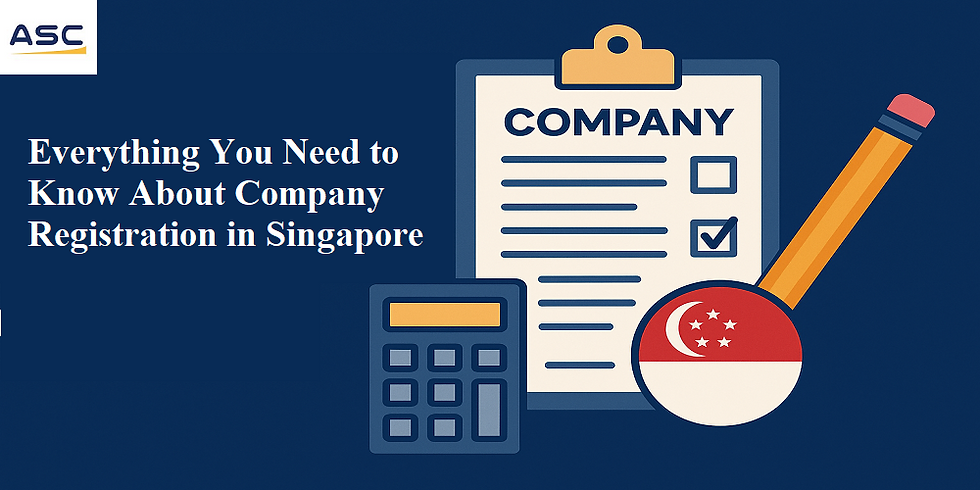Everything You Need to Know About Company Registration in Singapore
- groupasc93
- May 1, 2025
- 2 min read
Singapore is consistently ranked as one of the most business-friendly countries in the world, thanks to its strategic location, robust legal system, and low corporate tax rates. Whether you're a local entrepreneur or a foreign investor, Company Registration in Singapore is a straightforward process—but one that requires careful attention to compliance and legal procedures.
Here’s a complete guide to help you navigate the Business Registration Singapore process and understand what it takes to establish a company in this thriving Asian hub.
Why Register a Company in Singapore?
Singapore offers several advantages for businesses:
100% foreign ownership allowed in most sectors
Low corporate tax rates (as low as 17%)
Strong IP protection and legal system
Access to ASEAN and global markets
Reputation as a financial and logistics hub
These benefits make Company Registration in Singapore attractive for startups, SMEs, and multinational corporations alike.
Types of Business Entities in Singapore
Before proceeding with Business Registration Singapore, you must choose the right structure:
Private Limited Company (Pte Ltd) – The most common and scalable business type.
Sole Proprietorship – Suitable for single-owner businesses with low risk.
Partnership – For businesses with two or more owners.
Subsidiary or Branch Office – Preferred by foreign companies looking to establish a presence in Singapore.
For most foreign investors and serious entrepreneurs, the Private Limited Company is the most preferred option due to limited liability and access to tax exemptions.
Key Requirements for Company Registration
To register a company in Singapore, here are the main prerequisites:
At least one local director (Singapore citizen, PR, or EntrePass holder)
A company secretary (appointed within 6 months of incorporation)
A registered office address in Singapore
Minimum paid-up capital of SGD 1
At least one shareholder (individual or corporate)
The entire Company Registration in Singapore process is overseen by the Accounting and Corporate Regulatory Authority (ACRA), and usually takes just 1–3 days if all documents are in order.
Step-by-Step Company Registration Process
Company Name ReservationChoose a unique name and submit it for approval via ACRA’s BizFile+ portal.
Prepare Incorporation DocumentsThese include company constitution, director/shareholder details, and consent forms.
File with ACRASubmit all required documents online. Once approved, you’ll receive the Certificate of Incorporation.
Open a Corporate Bank AccountMost major banks in Singapore offer business banking services.
Register for Taxes (if applicable)Companies exceeding SGD 1 million in annual turnover must register for GST.
Post-Incorporation Compliance
After Business Registration Singapore, companies must:
Maintain proper accounting records
Hold Annual General Meetings (AGMs)
File Annual Returns with ACRA
Comply with local tax laws and corporate regulations
Staying compliant is critical to maintaining good standing with the authorities.
How ASC Group Can Help
Navigating the legal and administrative process of Company Registration in Singapore can be challenging—especially for foreign investors. ASC Group offers expert consulting services to ensure a smooth and hassle-free setup. From choosing the right business structure to handling documentation and post-incorporation compliance, our professionals provide end-to-end support tailored to your business goals.
Conclusion
With its pro-business environment and global connectivity, Singapore remains one of the top choices for company incorporation. However, ensuring legal compliance and proper structuring is key to long-term success. Partnering with a trusted advisor like ASC Group can make your Business Registration Singapore journey efficient, compliant, and future-ready.




Comments